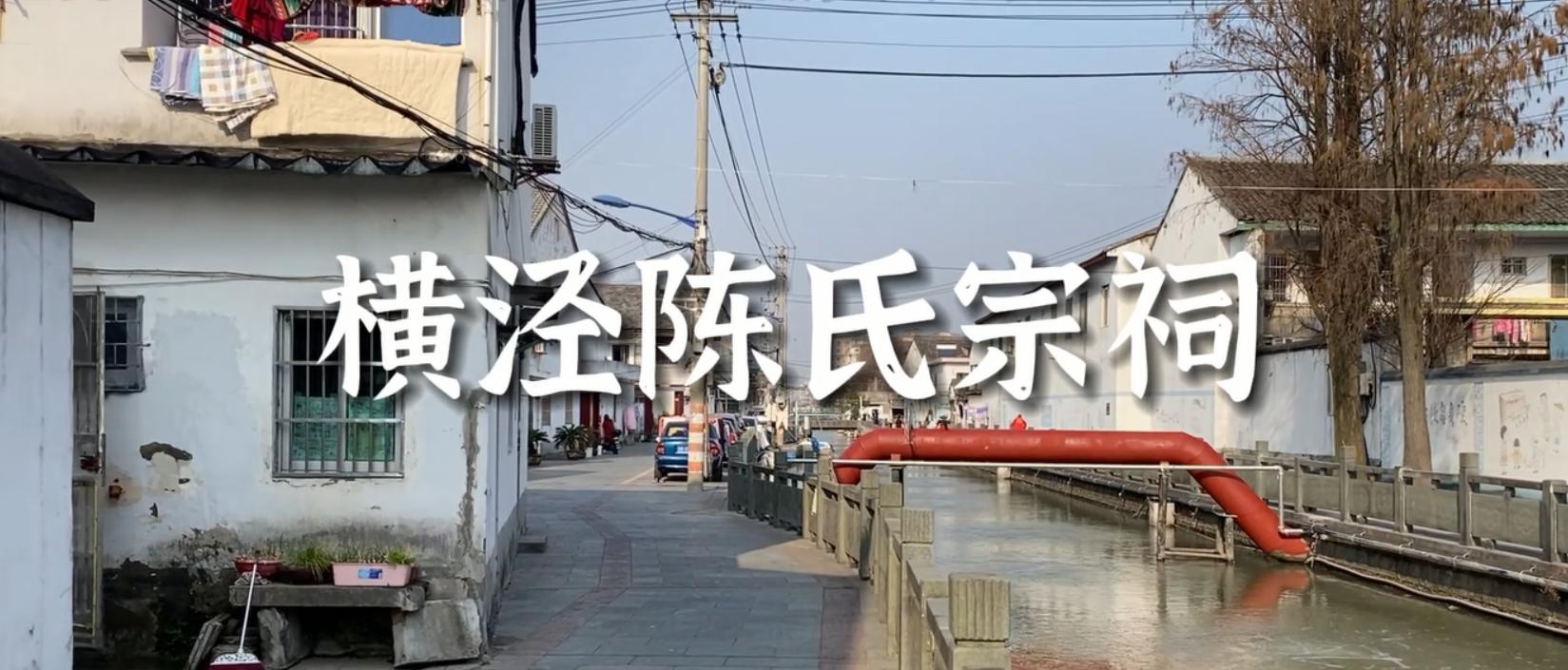Then yesterday's topic we continue to talk about the story of the Hengjing Chen Ancestral Hall.
Located not far south of the Cross-Jing Bridge, the Chen Ancestral Hall was built under the auspices of Chen Benshen, and has been renewed seven times from the Ming and Qing dynasties to the Republic of China. The ancestral hall we see today was rebuilt on a large scale in 2008, funded by the Qiu Pass town government.
Today's Chen Ancestral Hall. Sitting north facing south, five bays, two entrances before and after, the gate tower hangs a plaque of the Chen Clan Ancestral Hall, and the two walls read "Song Room Sanbao Mansion, Ming Dynasty Five Horse Gate". The shanglian of this pair of menlian refers to Chen Chang, the ancestor of the Hengjing Chen clan, "SanbaoFu" refers to the Southern Dynasty literary scholar, and Bao Zhao, who was also known as "Bao Yu" with the Northern Zhou Yuxin (Tang Dynasty changed it to "Bao Zhao" to avoid the conceit of wu), the twelfth year of the Southern Dynasty Song Yuanjia (435), Bao Zhao dedicated poetry and speech, and Was promoted by Liu Yiqing to the Linchuan Kingdom Waiter, and in the fifth year of the Ming Dynasty (461), he also served as the former army of Liu Ziyan, the king of Linhai, so he was also known as "Bao Join the Army", and "Three Houses" was actually synonymous with his official achievements, so This Shanglian is actually a tribute to the achievements of Chen Chang, the ancestor of our ancestors, who are almost comparable to bao Zhao of that year.
The lower league naturally refers to Chen Benshen, who brought the Chen family into the ranks of the Wang clan, "five horses" is actually a synonym for official positions, Chen Benshen during the Ren Ji'an Taishou period, due to his outstanding political achievements, the imperial court raised his rank from ZhengSipin to Zheng Sanpin, and he could enjoy the treatment of riding on the five-horse carriage, and it is precisely for this reason that the Hengjing Chen family can naturally be regarded as the real "five horse gate".
In addition to this couplet, the plaque of "Day Jintang" in front of the main hall of the ancestral hall is also worth mentioning. The word "Day Brocade" is taken from the "Book of Han and XiangBi Biography" "Rich and noble do not return to their hometown, such as Yijin Night Travel", the reverse use of the phrase "Yijin Night Trip", calling the return of rich and noble to their hometowns "Yijin Day Trip", and the province is "Day Jin". However, the word "Day Jin" in the Ancestral Hall of the Chen Clan does not represent the wealth of money, but praises Chen Ben's deep position in a high position, the people's prestige is outstanding, but he is a clean and honest official. According to local records, Chen Benshen served in Ren Ji'an for eighteen years, and when he left office, "there was no surplus wealth in his family", and the officials and gentry and the common people rushed to bid farewell. In history, there are two others with the same name as this Hengjing Chen's Daytime Jintang, the so-called "Three Daytime Jin of the World", do you know where the other two are? The comments section awaits you.
Speaking of the Chen Ancestral Hall, we mentioned yesterday that this Chen Ancestral Hall not only carries the inheritance of the Chen family, but also writes a moving red story, because he was still the former site of the Hengjing branch of the Communist Party of China at that time. In the 1920s, the Chan Ancestral Hall was used as a Day Jin Primary School. At the beginning of 1926, the party organization sent party member Wang Jiamu (Wang Xiaoman) to develop the revolutionary forces in Dongxiang, Ningbo. Chen Rui, principal of Zhongjin Primary School, Shang Danshu, a teacher, and Chen Xinchuan, a faculty member, joined the Communist Party of China. In November of the same year, the Hengjing Party Branch of the Communist Party of China was established in the Chen Ancestral Hall of the Day jin Primary School, which immediately launched a struggle against imperialism and feudalism and anti-bureaucratic capitalism, and wrote its own legend in the revolutionary history of Ningbo and even eastern Zhejiang. When the ancestral hall was rebuilt in 2008, a monument was deliberately erected to commemorate it, and the inscription reads "Pine Cypress Proud Frost, Lan Hui Liufang." Heroic and majestic, high mountains and long waters. The mighty clouds are soaring, and the achievements are far away. Thousands of generations, never forget. "Nowadays, every party member in Hengjing Village will come here on a special day to relive the history of that year, so that the revolutionary imprint and immortal spirit of the Hengjing branch can last forever in the hearts of future generations.
